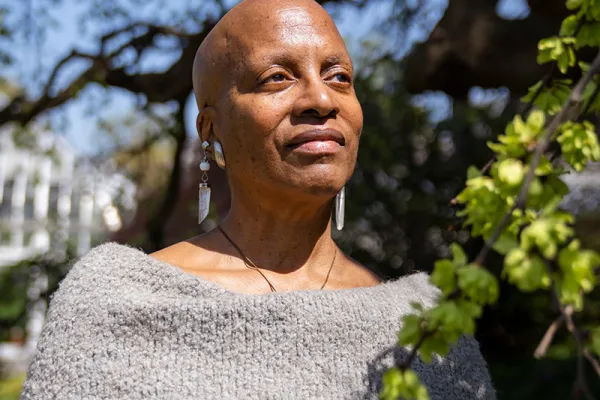Speaking Volumes
Research & Inquiry
Grounded Knowledge Panels provide an empowering forum for difficult discourse
Published June 25, 2023
As people become more divided and less likely to engage in conversation about challenging issues, it is essential to find a meaningful way to talk about tough topics. This is where Grounded Knowledge Panels come in.
Created by Valerie Joseph, mentoring administrative director of Achieving Excellence in Mathematics, Engineering, and Sciences (AEMES) programs at Smith, Grounded Knowledge Panels are public conversations conducted in small groups with those who have personal experience with a particular topic.
Joseph developed Grounded Knowledge Panels in 2015 and has since convened numerous panels on various subjects, including queer students in the sciences, racial bias and discrimination in academics, students with invisible disabilities, and students and staff managing COVID-19.
A cultural anthropologist, Joseph focuses her research interests on social and structural bias and discrimination. She is a skilled mediator and a diversity consultant and trainer.
In her position at Smith, she works with David Gorin, associate professor of chemistry and AEMES mentoring faculty director, to manage programs and events that support students from populations that have historically been excluded from the sciences.
Here, in her own words, Joseph talks about Grounded Knowledge Panels and the value of both speaking and listening.
I was inspired to create Grounded Knowledge Panels out of a deep hunger to have and hear public conversations where people confronted difficult issues in environments that allowed time and space for them to converse and be heard. I love many of the conversations that take place in my family and among my friends where there is spirited, free—and usually fun—discussion about a range of topics from politics to history to spirituality. I wanted to replicate that beautiful and vibrant energy.
The concept for the panels is grounded in Black culture and is a synthesis of my work in various fields, including anthropology, theater, Authentic Movement [a meditative improvisational movement practice], energy healing, social justice education, and mediation. In the past year, Grounded Knowledge Panels have become based in the Office for Equity and Inclusion, which sponsors them on campus.
Grounded Knowledge Panels begin with a convener selecting a small group of people who have authentic understanding of a particular topic. The convener also takes part in the panel discussion. My goal for each Grounded Knowledge Panel is for the process to be facilitated in such a way that a latecomer could not easily tell who is leading the conversation because the panelists are so comfortable with each other. While it’s true that I—or someone else—is facilitating the process, I use the term “convener” to emphasize my goal for effortless, flowing conversation that doesn’t need formal facilitation.
As the Grounded Knowledge panelists converse among themselves during the public conversation, audience members serve as “witnesses”—people who don’t simply listen and observe the discussion but who understand their role as responsible and respectful beholders of a group of people who often call upon courage to speak their truth. Both groups—panelists and witnesses—bring a distinctive power and depth to the experience of speaking and listening. Those ordinary activities become “extra-ordinary” in the Grounded Knowledge Panel model. The process creates a sense of connection, dynamism, and mutual responsibility that acknowledges a level of mutuality and respect that seems absent from much public discourse.
Witnesses often report that the experience is quite profound. In fact, some have reported that it has been transformative. One witness wrote, “Every Grounded Knowledge Panel I’ve attended both in person and on Zoom has expanded my understanding of what being human is.” This is at the crux of what makes Grounded Knowledge Panels so powerful for witnesses. Without the pressure to speak, they have little choice but to be present as their authentic selves as they engage in deeper listening. I also think that witnesses are moved by the courage of panelists who have decided to share themselves in a more intimate way than in typical panels. It’s a powerful juxtaposition of two groups being authentically present.
At the University of Colorado Boulder, I have co-convened Grounded Knowledge Panels with Donna Mejia, associate professor of theater and dance. We are in the preliminary stages of designing a research project there to measure the effectiveness of Grounded Knowledge Panels. In addition, through my collaboration with Gilburg Leadership, an organizational change consultancy, I did a Grounded Knowledge Panel on the experience of gender bias for the USDA’s Agricultural Research Service, and I am planning to do one for another branch of the U.S. government related to Indigenous peoples’ right to respect for their culture and history as it relates to sacred sites.
My job at Smith is about the dedication of efforts to support students from marginalized populations to succeed in STEM fields. To my mind, that’s a job grounded in social justice. I work with students from disenfranchised communities who may not believe they have a right to be a doctor or a vet or a scientist—or even to be at Smith. We need to help these students understand they can accomplish anything they set out to do.
This story appears in the Summer 2023 issue of the Smith Alumnae Quarterly.
Participating in a Grounded Knowledge Panel can be a transformative experience, Valerie Joseph says. Photograph by Vanessa Leroy
